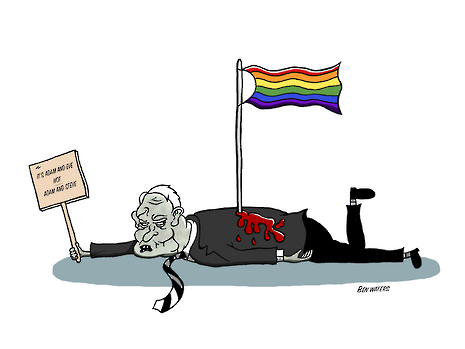Cambridge is right to raise the rainbow flag
It’s a step in the right direction, but flying the rainbow flag is by no means the end goal

On Monday, the flag-poles of many Cambridge colleges were adorned (many for the first time) with the Rainbow Flag, flown to mark the beginning of LGBT History Month. For many queer people in Cambridge it was a day to be proud of; a day when our feeling of belonging in this university was affirmed. In a small way, we have struck yet another victory on the path towards the full and equal inclusion of LGBT+ people in our university. Of course, some of the colleges were notably absent from this move – Girton, Trinity and St John’s, to name but a few – which has raised anger in some student bodies. But what is all the fuss about?
Believe it or not, the flags of our colleges are important. We may not have the kind of pseudo-idolatrous practices seen in the States towards our flags, but they remain part of the backdrop of collegiate life and represent a significant aspect of our history. The Union Jack or Royal Standard flies on the Monarch’s birthday, the college flag is flown on graduation day and major Christian and national festivals, and the flag flies at half-mast to mark the death of a member of the college. They are symbols of our modern values and respect.
With this rich history at work, to fly the LGBT+ flag is not just a meaningless gesture, but brings our flag into this tradition – our symbol, the banner of our campaigning efforts, is taken up and displayed for all to see. Flying from the ivory towers of a university which often seems so reluctant to change – in a society where gender-binaries and heteronormativity still retain their currency – these small flags remain radical signs of hope for anyone willing to look up from the streets to see them. They represent publicly our fundamental belief that LGBT+ people belong to this university as much as anyone else, and I hope pictures of our historic buildings hoisting these wonderful flags will be seen far and wide.
However, the flags of history are not just symbols to adorn our buildings but banners under which to campaign. For those of us who felt that our place in this university was affirmed and that our rights have been confirmed, LGBT History Month reminds us how far there is to go. Deeply entrenched attitudes of prejudice and suspicion still have to be changed. For some of us, especially gay men, it can feel like the fight is won – but, as long as others in the LGBT+ community suffer, it isn’t over. Yes, the recognition demonstrated by some (but, not all) of Cambridge’s historic colleges is a positive step, but there is much about this institution which requires reform. Those of us who have found the acceptance and freedom to be who we are have a duty, born from our shared history of oppression, to continue to campaign for those in the LGBT+ movement who still face daily and systematic oppression.
As Jack Renshaw’s Students of Cambridge video highlighted, the mainstream acceptance of LGBT+ people tends to focus heavily on the ‘LGB’ aspects of the movement. This month, we have a golden opportunity to turn the spotlight towards transgender folk who still suffer underrepresentation, and have not received the same acceptance as LGB people have in our university. Under this flag, we have the opportunity to draw our colleges’ and university’s attention to the systematic exclusion of non-binary people with gendered language in official documents; the retention of gendered dress codes and bathrooms; and the failure of the university to educate supervisors about their use of gendered language. Until the whole LGBT+ community is fully welcomed and accepted in Cambridge we simply can’t rest on our laurels and think the campaign is over. We have come so far, and we have much to be proud of, as we look back at the sacrifice of those who have gone before and the hard-won liberation which means that our colleges can fly the Rainbow Flag, but there is more to be done.
Unless we strengthen our solidarity with one another, continue to demonstrate to our colleges and university the ways in which it continues to oppress those who don’t fit into preconceived notions of gender and sexuality, and to challenge our own prejudices and assumptions, then the flag will be meaningless. We have to use this month to stand under the Rainbow Flag, in solidarity with one another, and with those around the world who still live with the risk of capital punishment for their sexuality. I don’t excuse myself of the need to continue to raise awareness and change attitudes; I write as an ordinand (trainee-priest) of a church which still refuses to acknowledge the legitimacy of same-sex marriage. I know when I am called to ‘fight the good fight’ (so to speak).
To finish, I would like to offer a personal thanks to all JCRs, LGBT+ groups and students who campaigned for this, and to all colleges who will fly the Rainbow Flag this month.
 News / Caius mourns its tree-mendous loss23 December 2025
News / Caius mourns its tree-mendous loss23 December 2025 News / Clare Hall spent over £500k opposing busway 24 December 2025
News / Clare Hall spent over £500k opposing busway 24 December 2025 Comment / Yes, I’m brown – but I have more important things to say22 December 2025
Comment / Yes, I’m brown – but I have more important things to say22 December 2025 Interviews / Politics, your own way: Tilly Middlehurst on speaking out21 December 2025
Interviews / Politics, your own way: Tilly Middlehurst on speaking out21 December 2025 Comment / The ‘class’ of Cambridge24 December 2025
Comment / The ‘class’ of Cambridge24 December 2025







